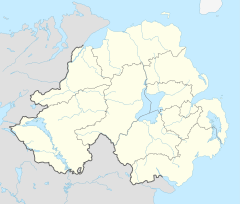Kesh, County Fermanagh
Kesh
|
|
|---|---|
 |
|
| Kesh shown within Northern Ireland | |
| Population | 972 (2001 Census) |
| District | |
| County | |
| Country | Northern Ireland |
| Sovereign state | United Kingdom |
| Post town | Enniskillen |
| Postcode district | 93 |
| Dialling code | 02868 |
| EU Parliament | Northern Ireland |
| UK Parliament | |
| NI Assembly | |
Kesh (from Irish Ceis, meaning 'wicker bridge') is a village in County Fermanagh, Northern Ireland. It is on the Kesh River about 1 mile (1.6 km) from Lower Lough Erne. The 2001 Census recorded a population of 972 people. It is within Fermanagh and Omagh district.
Because of its location close to Lough Erne the village has been a popular tourist resort. It has two caravan parks, a small attractive marina and other related industries both within its boundaries and the surrounding area. It is about 5 miles (8 km) from the border with the Republic of Ireland and 22 miles (35 km) from the Atlantic coast resort of Rossnowlagh in County Donegal, thus adding to its popularity with holiday makers, day-trippers and weekenders.
The toponym Kesh comes from 'ceis', the Irish word for 'wicker bridge', which refers to the crossing in the middle of the village. The village is not built around a parish church or chapel. Two Church of Ireland parishes of Magherculmoney and Tubrid meet at the river and their respective parish churches are each about 2 miles (3 km) either side of the village.
Kesh began as a ford or crossing place on the Glendarragh River. In the past Lough Erne came very much closer to the village than it does today. Before the first great Erne Drainage in the 1880s the lake was about eight feet higher and especially in time of flood may almost have reached Kesh. The rath on Rosscah Hill above the late Joe Robert's house, (a former rectory of Drumkeeran Parish) indicates original settlement here probably as far back as the Iron Age c 2000 years ago. There are two raths on this hill but the nearer to the house is believed to be a decorative feature made at the time of the construction of the house in the late 1700s. The large standing stone in Rosculban may be a relic of the Iron Age as well.
After a time the ford was augmented with a wicker bridge for which the Gaelic word is ceis and hense the village got its name. The name had been spelt in varying ways but generally as Kish or Cash until relatively modern times. An ancient saying in the locality which may refer to basket making and osier working in the area states that anyone gifted with a big behind, "had an ass on them like a Kesh creel."
...
Wikipedia

